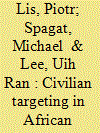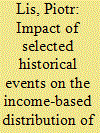| Srl | Item |
| 1 |
ID:
182661


|
|
|
|
|
| Summary/Abstract |
Armed conflict actors frequently target civilian populations. Thus, an improved understanding of such behaviour could pave the way to reducing it. We use the Civilian Targeting Index (CTI) and a broad array of geo-referenced data to investigate the spatio-temporal and economic dynamics of civilian targeting by conflict actors in Africa. Two main insights are generated. First, the civilian targeting behaviour of African non-state conflict actors is strongly influenced by the behaviour of other proximate actors. In particular, non-state actors tend to increase their civilian targeting after nearby non-state actors have done so. Possible mechanisms to explain such spatial spillovers include emulation and retaliation. Second, a negative relationship between economic activity and civilian targeting exists and applies to both state and non-state actors. In addition, CTIs of non-state actors tend to increase with population density, the geographical spread of their conflict activity and conflict duration. State actors have higher average CTIs than non-state actors do, but the gap between the two actor types tends to close during long-duration conflicts.
|
|
|
|
|
|
|
|
|
|
|
|
|
|
|
|
| 2 |
ID:
106932


|
|
|
|
|
| Publication |
2011.
|
| Summary/Abstract |
The study applies time series analysis to establish whether income-based transference of international terrorism took place in reaction to the rise of the fundamentalist-based terrorism, the end of the Cold War, 9/11, and the 2003 Iraq invasion. It introduces several extensions to an article by Enders and Sandler (2006); for instance, it uses two independent data sets and presents an alternative approach to the events in Iraq. The differences in results between this paper and Enders and Sandler (2006) are caused by the lack of consistency in employing the World Bank's income classification by the two authors. This study finds that the rise of fundamentalist terrorism brought increases across all countries, while the post-Cold War era resulted in a reduction in attacks only in high- and medium-income countries. 9/11 appeared to have had no long-lasting impact on the distribution of terrorism, while the Iraq invasion seemed to have reduced international terrorism in rich states.
|
|
|
|
|
|
|
|
|
|
|
|
|
|
|
|